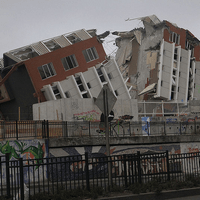In the wake of a major natural disaster, the narrative arc that subsequently unfolds has the potential to reshape the political landscape of the affected country. The script has been written and performed many times in many countries, with no two times ever exactly the same. After this weekend's massive earthquake in Chile, keep an eye on the response from the governments -- both the outgoing and incoming one -- to see how the quake ends up altering that country's long-term political picture.
No matter where disaster strikes, the script opens with shock, heartbreak and compassion. Then, it inexorably moves towards a cold political calculus about the performance of political leaders responsible for managing the aftermath. Even before the emergency starts moving into the back pages, praise and/or recriminations of top officials starts buzzing in the streets and in the media. By the time the earthquake, tsunami, or hurricane, takes its place in the history books, the political horizon can end up utterly transformed.
The first blow from a tragedy brought on by nature's fury falls on its direct victims -- those who lose their lives, their homes or their livelihoods. Eventually, the aftermath can transform the fortunes of major political players and their quest for popular support.

